496. In the same way as 584 was like
a signature of Venus we can assume Mercury
(Babylonian
Nabū) was characterized by
number 115:
... Ganz ähnlich is
der Name 'Gott von Duazag' des Gottes Nabū
... zu erklären.
Er
bezeichnet ihn als den Gott des Wachtstums, welches
als aus dem Osten stammend betrachtet wird, weil die
Sonne, die das Wachstum bringt, im Osten aufgeht.
Dass aber
Nabū als Ost-Gott aufgefasst wurde, hängt damit
zusammen, dass sein Stern, der Mercur, nur im Osten
oder Westen sichtbar ist
...
|
Synodic
cycles |
|
Mercury |
115.88 (115) |
|
Venus |
583.92 (584) |
|
Earth |
364.0 = π * 115.88 |
|
Moon |
413 = 364 + 49 |
|
Mars |
779.96 (780) |
|
Jupiter |
398.88 = 115.88 +
283.00 |
|
Saturn |
378.09 (378) |
|
Uranus |
369.66 (370) |
Number 23 as a measure for the
circuit of the figure of Hawaiian Lono (Rogo)
can
then be associated with Mercury because 2 * 115 =
230 (or 23 if disregarding the unnecessary symbol for zero):

|
o
te nuku |
erua nuku |
tagata oho
|
maitaki |
|
Nuku.
1.
Pau.: nuka,
crowd, throng. Ta.:
nuú, army,
fleet. Mg.: nuku,
a host, army. 2.
Mgv.: nuku,
land, country,
place. Sa.: nu'u,
district, territory,
island. Churchill. |
 |
 |
 |
 |
|
Cb9-27 (227 → π) |
Cb9-28 (620 = 392 +
228) |
Cb9-29 |
Cb9-30 (230 → 10 *
23) |
|
CLOSE TO THE FULL
MOON: |
|
Nov 29 (150 + 183)
ATRIA = α Tr. Austr.
(253.9) |
30 (*254 = *71 +
*183)
Tail-6 (Tiger)
WEI (Tail) = ε
Scorpii,
η Arae (254.3),
DENEBAKRAB = μ
Scorpii
(254.7) |
Dec 1 (365 + 335 =
700)
Ophiuchi (255.3),
GRAFIAS (Claws) =
ζ
Scorpii
(255.4)
*214.0 = *255.4 -
*41.4 |
2 (336 = 320 + 16)
κ Ophiuchi (256.2),
ζ Arae (256.5), ε
Arae (256.8),
CUJAM (Club) = ε
Herculi
(256.9) |
|
CLOSE TO THE SUN: |
|
May
30 (→ 5 * 30 = 150)
no star listed (70) |
31
TABIT =
π³
Orionis
(71.7),
π²
Orionis (71.9)
320 (South Pole
star, Dramasa) - 71
(Tabit) = 249
(Antares) |
June 1 (152 = 136 +
16)
π4
Orionis (72.1),
ο¹
Orionis (72.4),
π5
Orionis (72.8)
*31.0 = *72.4 -
*41.4 |
2
π¹
Orionis (73.0),
ο²
Orionis (73.4),
HASSALEH =
ι
Aurigae
(73.6),
π6
Orionis (73.9)
*32.0 = *73.4 -
*41.4 |
Mercury was
sometimes above the surface
of Mother Earth (i nika)
and sometimes below (i
raro).
... 'Savage tribes knew the
Pleiades familiarly, as well
as did the people of ancient
and modern civilization; and
Ellis wrote of the natives
of the Society and Tonga
Islands, who called these
stars Matarii, the
Little Eyes: The two seasons
of the year were divided by
the Pleiades; the first,
Matarii i nia, the
Pleiades Above, commenced
when, in the evening, those
stars appeared on the
horizon, and continued
while, after sunset, they
were above. The other
season, Matarii i raro,
the Pleiades Below, began
when, at sunset, they ceased
to be visible, and continued
till, in the evening, they
appeared again above the
horizon
...
This idea
seems to have been expressed
in Cb9-30, where
¼ can be characterized as below
and ¾ above, for instance as
in 9
* 30 = 270 days = ¾ * 360. Or
as 84 days below together with
9 * 28
above = 336 (= 4 * 84 = 12 *
28).
Furthermore, 168 (= 2
* 84) + 230 (= 2 * 115) =
115 + 283 (→ 28 * 3 = 84) =
398:
 |
 |
 |
 |
 |
|
Cb1-1 (393) |
Cb1-2 |
Cb1-3 |
Cb1-4 (82 +
314) |
Cb1-5 |
|
CLOSE TO THE
SUN: |
|
Al
Sharatain-1
/
Ashvini-1 /
Bond-16
(Dog) /
Mahrū-sha-rishu-ku-1
(Front of
the Head of
Ku)
SEGIN =
ε
Cassiopeia,
MESARTHIM =
γ
Arietis,
ψ
Phoenicis
(27.2),
SHERATAN
(Pair of
Signs) =
β
Arietis,
φ
Phoenicis
(27.4)
*351 = *27.4
- *41.4 |
ι Arietis
(28.0), λ
Arietis
(28.2), υ
Ceti (28.8) |
ALRISHA (The
Knot) =
α
Piscium,
χ
Phoenicis
(29.2), ε
Trianguli
(29.4),
ALAMAK
(Caracal) =
γ
Andromedae
(29.7)
*353 = *29.4
- *41.4 |
Arku-sha-rishu-ku-2
(Back of the
Head of Ku)
2h (30.4)
κ
Arietis
(30.3),
HAMAL
(Sheep) =
α
Arietis
(30.5)
ALKES (α
Crateris)
|
DELTOTUM = β
Trianguli
(31.2), ι
Trianguli
(31.7), η
Arietis
(31.9)
|
|
'March 21
(0h)
|
22 |
23 (82) |
24 |
Julian
equinox |
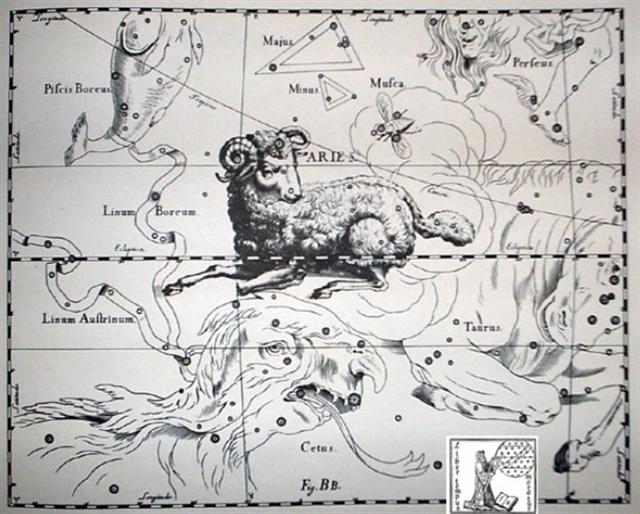 |
 |
| Cb1-6 (398) |
| ξ¹ Ceti (32.1) |
398 (Jupiter) = 115 (Mercury) + 260 + 23.
The distance between Cb1-6 (398) and Cb8-21 (584) is 185 days - equal, we remember, to a quarter of the total number of glyphs on the C tablet:
| 185 |
koia ia |
kua haga ia - kua huki |
koia ra - tona mea |
 |
 |
 |
| Cb8-21 (584 = 392 + 192) |
Cb8-22 |
Cb8-23 (171 + 23 = 194) |
| CLOSE TO THE FULL MOON: |
| Oct 25 (115 + 183)
τ Lupi, δ Oct. (218.1), φ Virginis (218.7)
FOMALHAUT (α Piscis Austrini) |
26 (365 + 299 = 664)
σ Lupi (219.1), ρ Bootis (219.5), HARIS (Keeper) = γ Bootis (219.7 |
27 (300)
σ Bootis (220.2), η Centauri (220.4)
*179.0 = *220.4 - *41.4 |
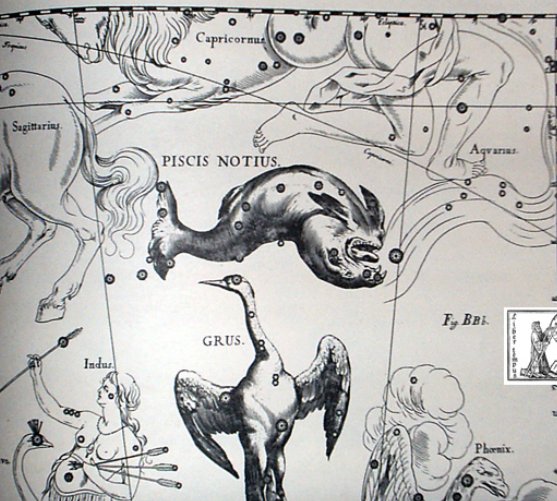 |
| ºOct 21 |
22 (295) |
23 |
| 'Sept 28 |
29 |
30 (273) |
| "Sept 14 |
15 |
16 (259) |
| AUG 21 |
22 (600) |
23 (236) |
| CLOSE TO THE SUN: |
| April 25 (115 = 480)
ξ¹ Arietis (35.0), ρ Ceti (35.4), ξ² Ceti (35.9) *359.0 = *35.4 - *41.4 |
26
σ Ceti (36.9) |
27
ν Ceti (37.9) |
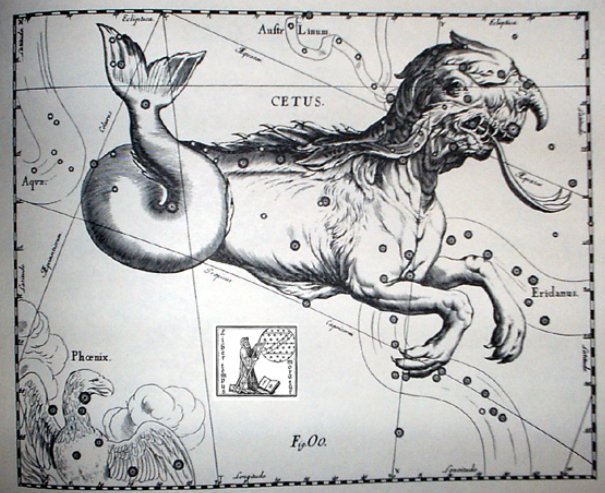 |
| ºApril 21 (111) |
22 |
23 |
| 'March 29 (88 = 115 - 27) |
30 |
31 |
| "March 15 (74 = 115 - 41) |
16 |
17 |
| FEBR 20 (51 = 115 - 64) |
21 |
22 |
Cetus was clearly personifying the change from Water to Land and therefore Piscis Austrinus (Notius) ought to have personified the opposite point, viz. where Land became inundated:
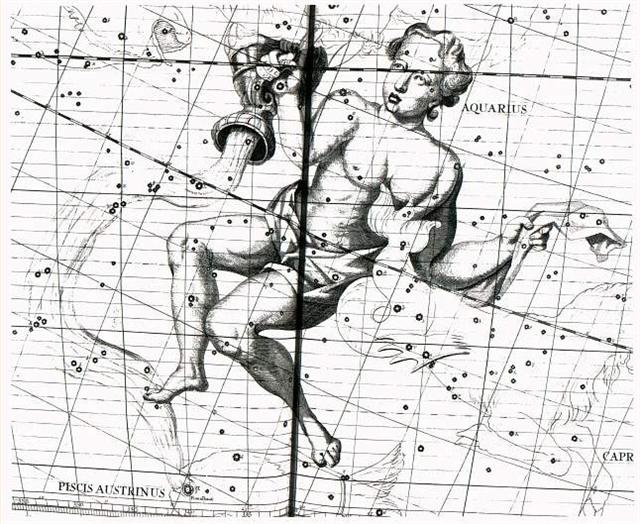

Between the back side of the head and the face - between Mother Earth and Father Sky - was the place for the ears (at the horizon with Mercury). This could explain the curious eye formed like the figure of 8 in the illustration of Cetus above. Or the peculiar 'hair-lock' which was flowing on the right side of the head of Horus (the Sun child at the horizon in the east):
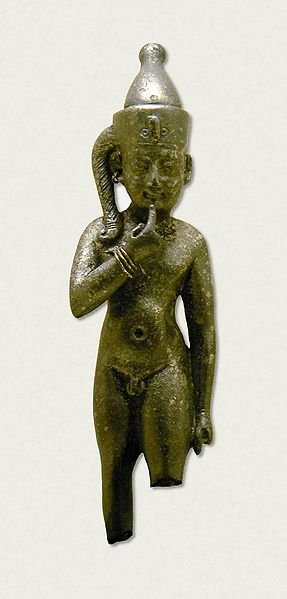 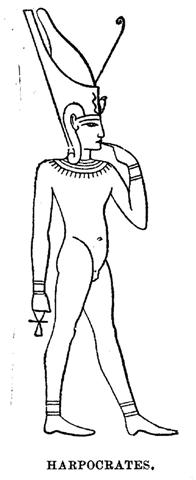
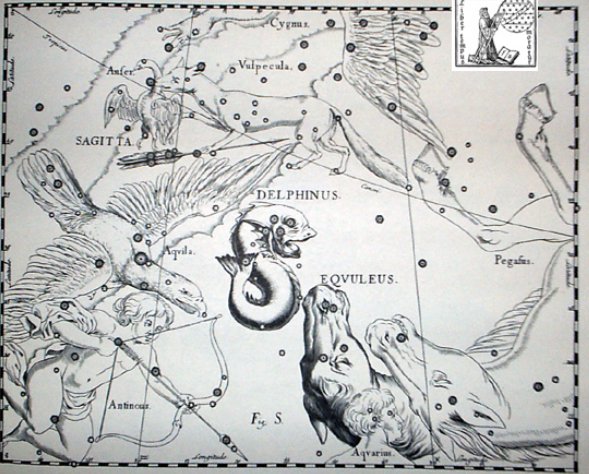
|














